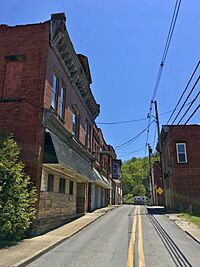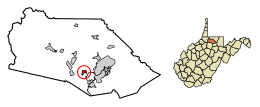Monongah, West Virginia facts for kids
Quick facts for kids
Monongah, West Virginia
|
||
|---|---|---|

Bridge Street
|
||
|
||

Location of Monongah in Marion County, West Virginia.
|
||
| Country | United States | |
| State | West Virginia | |
| County | Marion | |
| Incorporated | 1891 | |
| Government | ||
| • Type | Mayor–Council | |
| Area | ||
| • Total | 0.53 sq mi (1.38 km2) | |
| • Land | 0.49 sq mi (1.26 km2) | |
| • Water | 0.04 sq mi (0.12 km2) | |
| Elevation | 961 ft (293 m) | |
| Population
(2020)
|
||
| • Total | 972 | |
| • Estimate
(2021)
|
993 | |
| • Density | 2,354.51/sq mi (909.01/km2) | |
| Time zone | UTC-5 (Eastern (EST)) | |
| • Summer (DST) | UTC-4 (EDT) | |
| ZIP codes |
26554-26555
|
|
| Area code(s) | 304 | |
| FIPS code | 54-55276 | |
| GNIS feature ID | 1555149 | |
| Website | Official Website: http://www.local.wv.gov/monongah/Pages/default.aspx | |
Monongah is a town in Marion County, West Virginia, United States. It is located where Booths Creek flows into the West Fork River. In 2020, about 972 people lived there. Monongah became an official town in 1891. Its name comes from the nearby Monongahela River.
Contents
History of Monongah
Long ago, about 1,500 to 2,000 years ago, ancient people called the Adena and Hopewell lived in this area. By the time European traders and settlers arrived, there were very few native people left. This was likely due to wars.
Monongah was once known as Briar Town in 1886. Later, it was called Camdensburg. This name honored Johnson N. Camden, who was a United States Senator from West Virginia. In 1889, Camdensburg was described as a "new mining and coking town" that was expected to become important.
Monongah officially became a town in 1891.
The Monongah Mining Disaster
Monongah faced a terrible tragedy on December 6, 1907. An explosion happened at the Fairmont Coal Company Mines No. 6 and No. 8. All 358 miners working underground died, along with an engineer on the surface. This event is known as the Monongah mining disaster.
The miners who died came from many different countries. There were 171 Italians, 85 Americans, 52 Hungarians, 31 Russians, 15 Austrians, and 5 Turks. Three more people died later because of the disaster, bringing the total to 361 victims. This accident left about 250 women without husbands and 500 children without fathers.
After the disaster, a group called the Monongah Relief Committee was formed to help. Mayor W.H. Moore was part of this committee. Later, the Monongah and Fairmont committees joined together to help even more.
In 2007, 100 years after the disaster, memorials were built in the town center. One memorial is a statue called Monongah Heroine. It shows a mother holding a baby with another child beside her. This statue honors the mothers and widows of the miners who died. The idea for the statue came from Catarina Davia, a woman who lost her husband in the disaster. She was said to have walked to the mine twice a day to collect coal after her husband's death.
Another memorial is an engraved metal bell and plaque. It was placed by Italian groups to remember the many victims from Molise, a region in southern Italy.
Father Everett Francis Briggs, a Catholic missionary, helped with the memorial project. He passed away just a few days after it was finished. In 2002, a bridge in Marion County was named the Father Everett Francis Briggs Bridge to honor his work.
Geography of Monongah
Monongah is located at 39°27′45″N 80°13′06″W / 39.46250°N 80.21833°W.
The town covers about 0.53 square miles (1.38 square kilometers). Most of this area is land, with a small part being water.
Even though it's a small town, Monongah has several smaller areas or neighborhoods. These include East Monongah, Brookdale, Traction Park, Thoburn, Tower Hill, and West Monongah. Before it was officially named Monongah, the town was called "Briartown." Many people think of it as the unofficial capital for small coal mining towns.
The West Fork of the Monongahela River flows through Monongah. Also, Booths Creek joins the West Fork in Monongah. Booths Creek is named after James Booth, who was killed by Native Americans in 1778.
Population and People
| Historical population | |||
|---|---|---|---|
| Census | Pop. | %± | |
| 1900 | 1,786 | — | |
| 1910 | 2,084 | 16.7% | |
| 1920 | 2,031 | −2.5% | |
| 1930 | 1,909 | −6.0% | |
| 1940 | 1,790 | −6.2% | |
| 1950 | 1,622 | −9.4% | |
| 1960 | 1,321 | −18.6% | |
| 1970 | 1,194 | −9.6% | |
| 1980 | 1,132 | −5.2% | |
| 1990 | 1,018 | −10.1% | |
| 2000 | 939 | −7.8% | |
| 2010 | 1,044 | 11.2% | |
| 2020 | 972 | −6.9% | |
| 2021 (est.) | 993 | −4.9% | |
| U.S. Decennial Census | |||
Monongah in 2010
In 2010, there were 1,044 people living in Monongah. There were 457 households, which are groups of people living together.
Most of the people in town (94.8%) were White. About 3.5% were African American. A small number of people were Native American, Asian, or from other backgrounds. About 1% of the population was Hispanic or Latino.
The average age in Monongah was 42 years old. About 19% of residents were under 18. About 18% were 65 years or older. The town had a nearly equal number of males (50.5%) and females (49.5%).
Economy and Industry
In 1901, the Fairmont Coal Company bought 36 mines, including six mines that belonged to the Monongah Company.
The town used to have a factory that made cement blocks, but it closed in 2002.
The broadcast tower for the Fairmont AM radio station, WMMN, was built in Monongah in the 1930s.
Monongah is also featured in the video game Fallout 76.
Education in Monongah
Monongah High School joined with other high schools in 1979. Students from Monongah, Mannington, Barrackville, and Fairview, West Virginia now attend North Marion High School. This school is located in Farmington, West Virginia.
There was also a private school called Saints Peter and Paul School in Monongah. It taught students from kindergarten to 8th grade. This school closed in 2013, and the buildings were taken down in 2011.
Notable People from Monongah
- Ruth Broe – One of the first women to join the United States Marine Corps.
- Sam "Toothpick" Jones – A famous Major League Baseball pitcher.
- Roman Prezioso – A state senator in West Virginia.
- Nick Saban – A well-known sportscaster and former American football coach.
See also
 In Spanish: Monongah (Virginia Occidental) para niños
In Spanish: Monongah (Virginia Occidental) para niños
 | Jackie Robinson |
 | Jack Johnson |
 | Althea Gibson |
 | Arthur Ashe |
 | Muhammad Ali |


